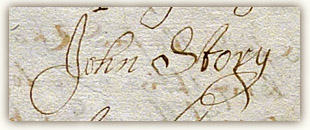
|
John Story |

Kendal: Cumbria Record Office MS WDFC/FI/12: Minute book of Kendal Monthly and Quarterly Meetings
© Reproduced by kind permission of the Society of Friends, Kendal and Sedbergh Meeting
John Story was a husbandman from Preston Patrick who ‘was Called unto the worke of the Ministrey from a low Estate in the World, yet of an honest, poore ffamelly,1 & while he kept Humble & low was very servisable, Espechally in the defence of truth against opposers thereof, in sevrall dispute to the Advantage of truth, being well read in holy scriptuer, and had a large undrstanding & memory and a grace Carriage’ [First Publishers of Truth 256]. Story joined with John Wilkinson of Millholme, near New Hutton in Westmorland, and together the two men travelled, publishing the truth in particular in Wiltshire and the west of England.
Story and Wilkinson later gained prominence within the movement as the progenitors of the Story-Wilkinson Controversy, when ‘with some Librtine spirits, [they] run Jnto a sepration, And J: S: Cheifely the Cause’ [FPT 267]. This threatened to split the movement over a number of years, between 1673 and 1679. Problems began with the passing of the Second Conventicle Act in 1670, in response to which some Westmorland Friends centred around Preston Patrick began to meet secretly, thereby evading the imprisonment endured by Friends elsewhere who continued to meet openly and eliciting the disapproval of their meeting. More general criticisms of mainstream Quaker authority and practice followed from the breakaway group; particularly at issue was the instituting of regular Monthly and Quarterly Meetings, which Fox had been advocating and establishing for a number of years. Story and Wilkinson were against such institutionalisation of the movement, holding that formally scheduled meetings were contrary to the basic Quaker principle of the individual’s apprehension of the workings of the Spirit being the only authority and guide to action and behaviour. They also objected to the establishment of separate men’s and women’s meetings. The outcome was a split between the Preston Patrick group and the rest of the movement; dissent also surfaced in other parts of the country.
Three meetings on the subject of separation were held with the leaders of the Story-Wilkinson faction: at Worcester in 1675, at Draw-well, the Blayklings’ house near Sedbergh, in 1676, and in Bristol in 1678, none of which brought reconciliation. However, in the following year, 1679, Story made his clearest move towards a settlement, by confirming to the second-day morning meeting in London the expression of regret that he had published following the Draw-well meeting. The ramifications of the split, however, were felt more keenly and longer in Westmorland than elsewhere. Thomas Camm’s verdict on Story was that ‘a haughty scornefull hard man he is growen’ [Rooksby 29]; however, before he died, in 1681, he was said by Wilkinson to have attended a first-day meeting in Kendal, where he ‘cleared his Conscience in Testimony to the Antient Truth, in which his Doctrine was wonderful weighty, and his Experience very great’ [John Wilkinson The Memory of that Servant of God, John Story, Revived (London: 1683) 8].
Story wrote two defences of Quakerism, both before he became a contentious figure in the movement. The first was Babilons Defence Broken Down (1660), an answer to William Brownsford's The Quaker Jesuite (1660), defending the movement against the common anti-Quaker charge of popery; the second, A Short Discovery of Certain Truths of God (1664), was a response to John Batchiler's anti-Quaker tract, Christian Queries to Quaking-Christians (1663), and upheld Quaker beliefs about the inner light, the role of scripture, oaths, and social deference. John Wilkinson, who ‘did not Joyne againe in vnity’ [FPT 268] with Friends, wrote a personal testimony of his former fellow minister, The Memory of that Servant of God, John Story, Revived. Epistles and papers written by John Story concerning the separation controversy are included in this publication, as are testimonies of Story by many other Friends.
Sources
Hugh Barbour The Quakers in Puritan England (New Haven and London: Yale University Press, 1964)
William C. Braithwaite The Beginnings of Quakerism 2nd edition revised by Henry J. Cadbury (Cambridge University
Press, 2nd edition 1955)
William C. Braithwaite The Second Period of Quakerism 2nd edition prepared by Henry J. Cadbury (Cambridge University Press, 1961)
‘The First Publishers of Truth’: being early records, now first printed, of the introduction of
Quakerism into the counties of England and Wales edited Norman Penney (Friends Historical Society
Journal Supplements 1-5; London: Headley; New York: Taber, 1907)
George Fox The Journal of George Fox edited Norman Penney, 2 vols (Cambridge University Press, 1911)
Caroline L. Leachman ‘John Story’ in The Oxford Dictionary of National Biography (online edition: your
local library card will usually give you access)
John Punshon A Portrait in Grey: A Short History of the Quakers (London: Quaker Home Service, 1984)
Donald Rooksby The Quakers in North-West England: Part 1, The Man in Leather Breeches (Colwyn Bay:
Rooksby, 1994) pages 29 and 31.
Close window to return
1. Wilkinson, however, implies that the family were quite well off: ‘having Land, Goods and Trade', and says that Story ‘was well Educated in his Youth’ [The memory of that Servant of God, John Story, Revived (1683)]. Return